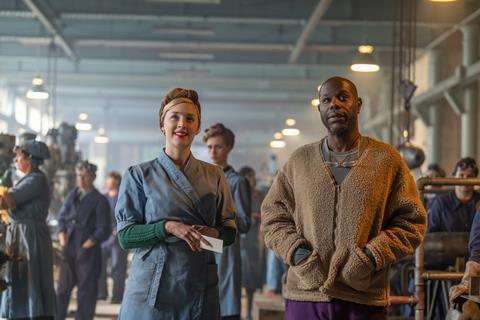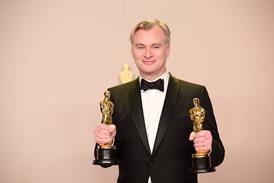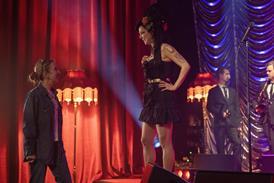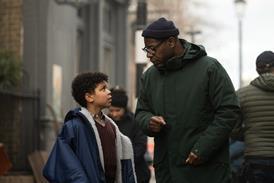Second World War drama Blitz sees a biracial child encountering diverse communities in a bombed-out city.
Audiences tend to have ideas about what is conventional in a movie about either of the world wars. There is a steady stream of them from Hollywood studios, and a certain aesthetic – and expectation – of such films develops over time.
Some may have projected those conventions onto Steve McQueen’s Blitz. It is partly true, says the director, that his Apple Original Films-backed Second World War epic trades in those hallmarks. There is a central odyssey for protagonist George (Elliott Heffernan), a nine-year-old boy in London sent away for his protection by his mother (Saoirse Ronan), who struggles to find his way home through a city under siege.
But life is more complex for George, whose Grenadian father was deported before he was born. Raised by a protective mother and grandfather in an east London neighbourhood, George is still treated as an outsider by the friends he plays cricket with. So when he jumps off a moving train, he is not just a boy trying to get home: he is a Black boy making a perilous journey.
“I’m using conventional storytelling to say something completely different,” says McQueen, “because it is a choice how people portray the war.”
This is McQueen’s second war story in two years – the first was his Amsterdam-set documentary Occupied City, written and produced by his wife Bianca Stigter – and the 55-year-old filmmaker chose to tell the truth about his hometown during a period that is still intrinsically wrapped up in Britain’s national identity. “[There was a] large Chinese community, the Black community, the Asian community,” says McQueen. “This is the home of the colonies – the UK – and that’s how central London looked like, but you never see it portrayed like that.”
You also do not often see women as the focus of movies about the period. Despite the war effort being virtually synonymous with Rosie the Riveter’s flexed bicep, “[women] are not even in the picture”, scoffs McQueen. “Or they’re hysterical or they’re crying or they’re used as a mattress.” In fact, they were the emotional and physical backbone of the country.
McQueen embarked on painstaking research to equip himself with the right answers when viewers watch Blitz, observe its vibrant diversity on screen and inevitably ask, “Well, is that true?” In addition to fact-finding at the Imperial War Museum in London, he worked closely with the film’s historical adviser Joshua Levine, whose 2015 book The Secret History Of The Blitz informed the project.
The resulting film – McQueen’s first scripted feature since Widows in 2018 (though he considers his BBC/Prime Video series Small Axe to be a feature) is “all true”. But he dares viewers to look beyond what is just on screen and see how lived experiences of race, his included, contribute to Blitz. “I’m not interested in surface,” says McQueen. “Things are more complex and complicated than people seem to think.”
Take, for example, the casting of Stephen Graham, who plays a scene-stealing racketeer who robs the dead at bomb sites. Graham, whose paternal grandfather was Jamaican, “identifies himself as Black and mixed heritage”, explains McQueen. He applied that same intentionality when casting musician Paul Weller, who has biracial children, as George’s grandfather.
“I thought, ‘He will understand, when he sends George away, what kind of landscape he’d be going into,’ which would be a dangerous one for a Black child,” says McQueen. “People have called me the N-word or the B-word or whatever they say, and I feel certain people don’t understand that when a child of George’s age is called a [defamatory word], you have to think about how it cuts.”
Personal view

McQueen watched on in horror during the UK’s race riots in August and a fascist march in London in October.
“Those aspects of who and what we are are reflected in Blitz. The world is on fire right now in Somalia, Ukraine, Lebanon, Palestine, Israel. I made a movie about 1940 but actually it can be seen as 2024. As an artist, I haven’t felt more useful than that. Everything is about race right now,” he says.
Blitz’s focus on its rich tapestry of characters and their relationships, rather than action sequences and explosions, is evident. There are setpieces in a flooded Tube station (a scene that ran so over budget McQueen says he offered funds to complete it, though his publicist later clarifies that Apple did not take him up on it) and a bomb blast at Soho’s Café de Paris, but panoramas of blitzed-out London are minimal.
Did the film’s streaming home on Apple TV+ alter his vision for the film? McQueen, who bristles at the notion, says the majority of movies he watched growing up, from Ben‑Hur to The Bridge On The River Kwai, were on television.
“Obviously, you’re not catering for that; you’re catering for the big screen,” he says. “The cinema experience is what this is made for, but it’s one of those things where we’re in a different age now.”
Blitz had its world premiere opening the BFI London Film Festival in October and received a UK cinema release on November 1, grossing $1.3m (£1m), before landing on the streamer on November 22.
In France, Apple secured an “exceptional visa” from the CNC for a two-day theatrical run before its streaming debut – the move exempted Blitz from the mandated 17-month holdback between its theatrical release and streaming premiere. Such negotiations are “just the lay of the land right now”, says McQueen, who adds, not a little wistfully, “I hope, at some point, the business corrects itself.”
Speaking of the industry, many filmmakers despair over Hollywood’s aversion to taking risks amid the financial reckoning that followed the Hollywood writers and actors strikes amid budgets tightening at the streamers. Not McQueen, though. You will not find any scripts in his top drawer, waiting for the right time to pitch. “I just do it,” he declares, careful not to surrender any clues as to his next project. “I know I’m very fortunate. I don’t take it for granted.”
Whatever comes next will, he promises, be unlike what has come before (rumours abound of a sci-fi series for Prime Video).
There is an “arrogance”, he says, about a director having a self-awareness about the style that has been ascribed to them by the media and audiences. “I don’t even know who I am. I’m not even interested,” he asserts. “Every time I make a movie or anything – artwork! – it’s got to be as if no-one knows me.”
McQueen is fond of quoting one of his mother’s favourite sayings: “Don’t let your left hand know what your right hand is doing.” Make art, he suggests, but do not shout about how you are doing it.
“Each individual subject deserves what it deserves; I don’t come with my stencil and put it over the subject,” says McQueen, noting that Hunger and Blitz are vastly different films.
“The subject has to tell me what it wants,” he continues. “I’m excited about cinema, I’m excited about film, and whatever mechanic is there to advance the subject.”




















![[Clockwise]: 'Anora', 'The Substance', 'Kneecap', 'All We Imagine As Light'](https://d1nslcd7m2225b.cloudfront.net/Pictures/100x67/6/4/0/1439640_screenteamfilms_937759.jpg)





No comments yet